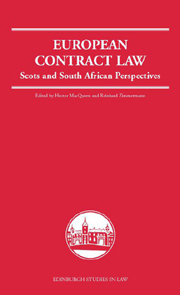Book contents
- Frontmatter
- Contents
- Preface
- List of Contributors
- List of Abbreviations
- 1 Ius Commune and the Principles of European Contract Law: Contemporary Renewal of an Old Idea
- 2 Good Faith
- 3 Offer, Acceptance, and the Moment of Contract Formation
- 4 The Battle of Forms
- 5 Agency
- 6 Threats and Excessive Benefits or Unfair Advantage
- 7 Interpretation
- 8 Third-Party Contracts
- 9 Payment
- 10 Specific Performance and Special Damages
- 11 Termination for Breach of Contract
- 12 Assignment
- 13 Capitalisation of Interest
- Appendix: The Principles of European Contract Law
- List of Cases
- Index
Preface
Published online by Cambridge University Press: 05 July 2013
- Frontmatter
- Contents
- Preface
- List of Contributors
- List of Abbreviations
- 1 Ius Commune and the Principles of European Contract Law: Contemporary Renewal of an Old Idea
- 2 Good Faith
- 3 Offer, Acceptance, and the Moment of Contract Formation
- 4 The Battle of Forms
- 5 Agency
- 6 Threats and Excessive Benefits or Unfair Advantage
- 7 Interpretation
- 8 Third-Party Contracts
- 9 Payment
- 10 Specific Performance and Special Damages
- 11 Termination for Breach of Contract
- 12 Assignment
- 13 Capitalisation of Interest
- Appendix: The Principles of European Contract Law
- List of Cases
- Index
Summary
This volume set out initially to test the claim that, as combinations of Civil and Common Law influences, the mixed systems of contract law in Scotland and South Africa have in some sense anticipated the content of the Principles of European Contract Law (PECL) concluded and published in 2003 by the unofficial Commission on European Contract Law presided over by Professor Ole Lando (Copenhagen). In a way, therefore, the volume was supposed to build on the foundations laid by a trilogy of historical and comparative studies on Scots and South African law, culminating in a volume affectionately dubbed Double Cross, but in reality entitled Mixed Legal Systems in Comparative Perspective: Property and Obligations in Scotland and South Africa (2004). At the Edinburgh conference where the papers were first presented in December 2004, however, it became clear that the studies could and should go much further. For example, how far might the Scots and South African contract laws benefit from reform along the lines proposed by PECL? And given that PECL appeared likely to become the basis for some sort of European contract law (see further below), what criticisms might be made of it in the light of experiences made in Scotland and South Africa? Nor is PECL the only possible model for a European – or indeed global – contract law. Account has also to be taken of such projects as the (also unofficial) Code of Contract Law prepared by the Academy of European Law under the leadership of Professor Giuseppe Gandolfi (Pavia) and of the Principles of International Commercial Contracts (PICC) first published by UNIDROIT in 1994 and issued in a second edition in 2004.
- Type
- Chapter
- Information
- European Contract LawScots and South African Perspectives, pp. vii - xiPublisher: Edinburgh University PressPrint publication year: 2006

